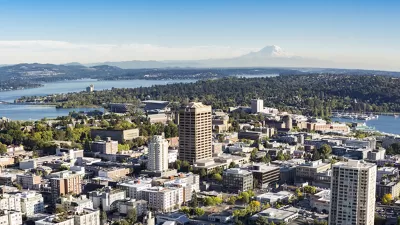Millions of people who live in manufactured homes were already vulnerable. The pandemic has made their housing situations even more precarious.

Jung Hyun Choi and Laurie Goodman write about the impact of COVID-19 on people living in manufactured housing, 7 percent of U.S. households. "These 22 million renters and owners tend to have lower incomes and work in industries that are vulnerable to the pandemic, yet these households mostly fall outside the protections offered by the Coronavirus Aid, Relief, and Economic Security (CARES) Act."
Owners and renters of manufactured homes make up a higher percentage of workers in the industries hardest hit by the pandemic—food and accommodation, retail, construction, entertainment, and other services—compared to owners of single-family homes and other renters. They also have lower incomes than homeowners and other renters.
"Despite their greater vulnerability, most owners of manufactured homes do not qualify for CARES Act forbearance relief, because 77 percent of all new manufactured homes are titled as 'personal property' rather than 'real estate.'" For owners who are able to get forbearance on the "chattel loans" of manufactured homes, the repayment terms are generally less favorable than those for federally backed mortgages.
"Renters also did not receive immediate relief. The CARES Act eviction moratorium, which expired July 24, did not apply to most renters in manufactured homes, with two exceptions: the manufactured home parks financed with federally backed mortgages (2,400 out of 45,000) and the few investor-owned properties with federal loans," note Choi and Goodman.
FULL STORY: 22 Million Renters and Owners of Manufactured Homes Are Mostly Left Out of Pandemic Assistance

Planetizen Federal Action Tracker
A weekly monitor of how Trump’s orders and actions are impacting planners and planning in America.

Maui's Vacation Rental Debate Turns Ugly
Verbal attacks, misinformation campaigns and fistfights plague a high-stakes debate to convert thousands of vacation rentals into long-term housing.

Restaurant Patios Were a Pandemic Win — Why Were They so Hard to Keep?
Social distancing requirements and changes in travel patterns prompted cities to pilot new uses for street and sidewalk space. Then it got complicated.

In California Battle of Housing vs. Environment, Housing Just Won
A new state law significantly limits the power of CEQA, an environmental review law that served as a powerful tool for blocking new development.

Boulder Eliminates Parking Minimums Citywide
Officials estimate the cost of building a single underground parking space at up to $100,000.

Orange County, Florida Adopts Largest US “Sprawl Repair” Code
The ‘Orange Code’ seeks to rectify decades of sprawl-inducing, car-oriented development.
Urban Design for Planners 1: Software Tools
This six-course series explores essential urban design concepts using open source software and equips planners with the tools they need to participate fully in the urban design process.
Planning for Universal Design
Learn the tools for implementing Universal Design in planning regulations.
Heyer Gruel & Associates PA
JM Goldson LLC
Custer County Colorado
City of Camden Redevelopment Agency
City of Astoria
Transportation Research & Education Center (TREC) at Portland State University
Jefferson Parish Government
Camden Redevelopment Agency
City of Claremont





























